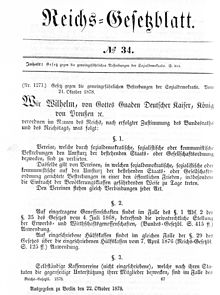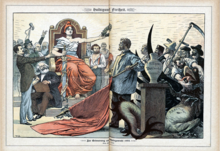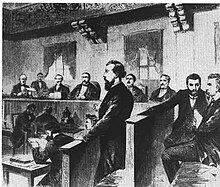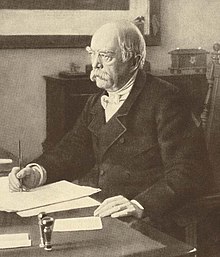Socialist law

| Basic data | |
|---|---|
| Title: | Law against the common dangerous endeavors of the social democracy |
| Short title: | Socialist law ( coll. ) |
| Type: | Imperial Law |
| Scope: | German Empire |
| Legal matter: | Constitutional law , police law , ancillary criminal law |
| Issued on: | October 21, 1878 ( RGBl. P. 351) |
| Entry into force on: | October 22, 1878 |
| Last change by: | Sentence 1 G of March 18, 1888 (RGBl. P. 109) |
| Effective date of the last change: |
April 9, 1888 (Art. 2 Sentence 3 RV ) |
| Expiry: | September 30, 1890 (sentence 1 G of March 18, 1888, RGBl. P. 109) |
| Please note the note on the applicable legal version. | |
The Socialist Law is the abbreviation for the law against the dangerous efforts of the social democracy , which was valid from 1878 to 1890 and was extended several times during this time. Because of the various individual provisions in 30 paragraphs , the annual new submission and because of small modifications, one often speaks of the socialist laws in the plural .
The law forbade socialist , social democratic , communist associations, assemblies and writings whose purpose was to overthrow the existing state and social order. The Socialist Act resulted in the relocation of social democratic activities underground and abroad as well as mass arrests and expulsions. Only the Social Democrats in the Reichstag remained untouched due to their parliamentary immunity . Despite the massive politics of repression, the candidacy and election of social democratic politicians as private persons was still possible and the only legal possibility for political and legal representation of interests.
For an appropriate analysis of the socialist laws, recent research refers to the importance of the international context, where socialists were sometimes exposed to more severe repression than in the German Reich.

prehistory
Even before the establishment of the German Empire as a constitutional monarchy (1871), two initially competing social democratic parties had been established: the reform-oriented General German Workers 'Association (ADAV), founded in 1863 on the initiative of Ferdinand Lassalle , and the Social Democratic Workers' Party , which was revolutionary in the Marxist sense ( SDAP), founded in 1869 by Wilhelm Liebknecht , August Bebel and others. Shortly after the founding of the Empire, the pro-Prussian ADAV President Johann Baptist von Schweitzer resigned after secret agreements with the conservative , monarchist Prussian government had been uncovered. As a result, the two parties grew closer. At the joint party conference in Gotha in 1875 , they united to form the Socialist Workers' Party of Germany (SAP), which was to be renamed the Social Democratic Party of Germany (SPD) in 1890 .

The terms socialism and social democracy were generally understood as synonyms in the language of the time and were strongly influenced by the philosophical, political and economic theories of Karl Marx and Friedrich Engels , who were living in exile in London at the time. According to revolutionary theory, the social democracy or its party in the German Reich, the SAP, claimed to be the party-political interest group of the workers' movement . It aimed to improve the social situation of the working class and ultimately to overcome the existing social and politically undemocratic structures of rule.
Because of their opposition to the Franco-Prussian War of 1870/71 and their solidarity with the revolutionary Paris Commune in 1871, August Bebel and Wilhelm Liebknecht were sentenced to two years imprisonment at the Leipzig high treason trial in 1872 .
Reich Chancellor Otto von Bismarck , basically a conservative who was based on the monarchical principle and who was reserved or even hostile towards democratic ideas, viewed the SAP as an "enemy of the Reich" from the start and took repressive measures against social democracy and the still young trade union movement even before the Socialist Act .
The attacks on the emperor as an occasion

In 1878 two unsuccessful assassinations were carried out on Kaiser Wilhelm I : on May 11th by Max Hödel and on June 2nd by Karl Eduard Nobiling . Bismarck took these attacks as an opportunity to use the Socialist Law to take more rigorous and effective action against the social democracy, which was becoming increasingly influential in the working class. Although Hödel had been expelled from the SAP shortly before his attack and Nobiling's attack was guided by personal delusions, Bismarck had it spread that the attacks were due to the Social Democrats. A connection between the attacks and social democracy that goes beyond the two individual perpetrators was and is still not demonstrable.
First bill
As early as May 1878 - after the first assassination attempt - Bismarck submitted a draft of the Socialist Law, which, however, was rejected by a large majority. Eugen Richter justified the rejection of the German Progressive Party, among other things, with the fact that bans and police measures would make the intellectual fight against social democracy impossible:
“The Minister may say: yes, the means are not enough, something must also be done to combat the agitation; but, gentlemen, the moment you silence one party, you make it quite impossible to fight this party, at least to fight it effectively in its agitation. All this power is paralyzed, and yet we must be of the opinion that ultimately this movement can be restricted only on this path of conviction. It doesn't help, this movement has to take the same route out of the German people where it got into; another path does not lead to the goal. "
Second draft law after the Reichstag election and adoption
The emperor was seriously injured in the second assassination attempt on June 2, 1878. Bismarck used the ensuing public hysteria to dissolve the Reichstag and to stage an "extermination campaign" against the Social Democrats, who were accused of intellectual complicity. In July, most of the National Liberals conformed to the conservative shift to the right in the election campaign.
In the newly elected Reichstag , a more stringent draft of the Socialist Law was presented, and there were disputes between the individual parliamentary groups. On October 19, 1878, the stricter bill prevailed with 221 to 149 votes. After the approval of the Federal Council on October 21 and the signing by Kaiser Wilhelm I , the law became final on October 22, 1878 when it was promulgated. It was valid through a total of four extensions until September 30, 1890.
Effects

Due to the Socialist Act, which was initially limited to two and a half years and then regularly extended, sub-associations, pamphlets and meetings of the Social Democrats, namely the Socialist Workers' Party (SAP) and its affiliated organizations, especially trade unions, were banned. Violations of the law were often punished with fines or even imprisonment. Under the political pressure of the law, many socialists fled into exile abroad, especially to France, Switzerland or England. Among them was Clara Zetkin , who was then in her mid- twenties , who later became a prominent pioneer of the socialist women's movement .
However, individuals could still run for elections for social democracy, so that their parliamentary groups could legally operate within the framework of the parliamentary work of the Reichstag or the state parliaments. Wilhelm Liebknecht, August Bebel, Wilhelm Hasenclever and Wilhelm Hasselmann, for example, sat in the parliament of the German Empire among the nine members of the SAP Reichstag since 1874 (partly as representatives of their predecessor organizations) . However, outside of the Reichstag, public appearance for the goals of SAP was associated with considerable legal risk. According to Section 28 of the Socialist Act, 797 Social Democrats were expelled as " agitators " from places in which the " minor state of siege " was imposed, including as strongholds of the Socialists Berlin , Leipzig , Hamburg and Frankfurt am Main .
The Socialist Law fought against the Social Democrats as “enemies of the Reich” and made the integration of workers and social democracy into the state and society more difficult. The de facto political expatriation of the social democratic opposition went hand in hand with a social expatriation, according to which social democrats were materially disenfranchised and persecuted at work. The persecution aroused the solidarity of large sections of the workforce and, since 1881, has led increasingly to electoral success for the candidates of the SAP who appear formally as individuals. Regionally, various workers' sports clubs or groups for friends of nature were formed as cover organizations in place of the banned party or trade union groups, in which political work was continued, albeit at high risk.
- Some important members of the Social Democratic Reichstag during the period of the Socialist Laws
Wilhelm Liebknecht (1826–1900)
August Bebel (1840–1913)
Wilhelm Hasenclever (1837–1889) resigned his mandate in 1888 due to illness
Wilhelm Hasselmann (1844–1916) was excluded from the SAP in 1880
Within the Social Democrats, social revolutionary politicians of the left wing in particular, led by Johann Most, who was already in exile in Britain, and the Reichstag member Wilhelm Hasselmann, called for - including violent - resistance to the oppressive practices of the authorities, whereby, for example, they positively responded to the assassinations of Russian social revolutionaries related to Tsar Alexander II . Such calls, however, were motivated by the leadership of the SAP as anarchist and, contrary to the goals of social democracy, rejected. Most and Hasselmann were expelled from the party in 1880 at the first SAP exile party congress at Wyden Castle in the Swiss canton of Zurich , particularly at the instigation of Ignaz Auer and August Bebel. Hasselmann then gave up his mandate in the Reichstag, which was formally valid until 1881, and emigrated to the USA. With the exclusion of the two best-known protagonists of anarchism from the German social democracy, their leading representatives hoped to get rid of the radical social revolutionary wing of the party and thus remove the basis of the anti-socialist propaganda of the pro-government parties and their press.

In the period that followed, socialist candidates for the Reichstag were able to record an increase in votes again. In addition to the representatives already represented, Karl Frohme in 1881 or Paul Singer in 1884 were elected to the Reichstag for the party. After the magazine Freiheit, distributed by Johann Most from his exile in London, lost its status as an organ of German social democracy with the exclusion of Mosts from the party and changed its content to an openly anarchist publication, it was increasingly replaced by the newspaper Der Sozialdemokrat , which became Main organ of German and international social democracy developed during the Socialist Law. The Social Democrat appeared in Zurich from 1879, edited by Paul Singer, and was illegally distributed throughout the Reich. From 1887 the newspaper was printed in London.
Bismarck, who recognized the explosiveness of the social question and wanted to learn from his defeat in the Kulturkampf , knew that repressive measures were relatively limited. Therefore, with the reformers in the empire, he pushed through the social legislation that was progressive for their time .

Seated, from left: Georg Schumacher , Friedrich Harm , August Bebel, Heinrich Meister , Karl Frohme .
Standing: Johann Heinrich Wilhelm Dietz , August Kühn , Wilhelm Liebknecht, Karl Grillenberger , Paul Singer .
A key goal of the Socialist Act, the reduction of the votes for the Social Democrats in the Reichstag elections, was not achieved - on the contrary: In 1881 the Social Democrats received only 311,961 votes, in 1884 it was 549,990, in 1887 763,128 votes, in 1890 even 1,427,000 votes . With the latter result, the SAP became, for the first time, the party with the largest number of voters in the Reich, even before it was renamed the SPD.
Internationally, too, the German social democracy had become the most influential socialist party of its time worldwide - another important indication of the relative weakness of the socialist laws. After the split in the International Workers' Association in 1872 and its dissolution by 1876 due to the conflict between the anarchist wing around Mikhail Bakunin and the Marxist wing around Karl Marx, after Marx's death in 1883 it was primarily Liebknecht's endeavor to create a new international unity Labor movement to come. On this he was in agreement with Friedrich Engels, who had inherited Marx's ideal legacy.
When the Socialist International was founded in Paris in 1889 , the socialist movement from the German Reich was involved with 85 of the 400 delegates from 20 countries in the founding congress of this Second International from July 14th to 20th, 1889 - among them August Bebel and Eduard Bernstein also Carl Legien as a representative of the German trade union movement, and with Clara Zetkin a representative of the socialist women's movement, at the time an exile in Paris. Liebknecht headed the German delegation and chaired the congress together with the French socialist Édouard Vaillant .
The repeal of the socialist law
In view of the growing influence of the SAP, the Socialist Law in the German Reich could no longer be upheld in the long term. In the annual cycle from 1879 onwards, the continued validity of the law was rejected in the Reichstag on January 25, 1890. The members of the German Reich Party and the National Liberals voted for the extension of the Socialist Law . The MPs of the Center , the German-Hanoverian Party , the Freedom Party , the German Conservatives and the Social Democratic Workers' Party as well as minority MPs who represented the Poles and Alsace-Lorrainers voted against the extension of the Socialist Law (see list of Reichstag MPs for the 7th electoral term ).
The failure by Bismarck of a bill that was intended to be permanently valid and otherwise tightened, as well as the strengthening of the social democracy in the Reichstag elections on February 20, 1890 , played a decisive role in the overthrow of Bismarck and his dismissal by Emperor Wilhelm II, who was enthroned in 1888 . As early as 1888, Bismarck had failed with a bill according to which social democrats could formally have been expatriated as Germans. The cause of the failure was not least that the members of the SAP exposed the unscrupulous practices of the political police in the Reichstag.
Overall, social democracy emerged stronger from the clashes. In the first Reichstag elections after the end of the Socialist Act on June 15, 1893, the Social Democratic Party received more votes than ever before (23.4%). Socialists therefore celebrated these Reichstag elections as a "great victory for freedom and peace" (see illustration "Homage to Freedom"). As a result of the export successes of German industry in the years after 1895 - the beginning of a long upswing with an increasing demand for labor - the socio-political conflict situation also lost its explosive tension.
Subsequent development: The role of the SPD until 1914
After the repeal of the Socialist Law, social democracy, which had called itself the SPD since the Erfurt program party congress of 1891, remained a serious power factor. In the 1912 Reichstag election , she emerged as the clear winner with 34.8% of the vote and 110 Reichstag seats. After August Bebel's death (1913), the moderately reform-oriented Friedrich Ebert became party chairman (alongside Hugo Haase ).
The spirit of the Socialist Law, however, continued to have an effect in politics and society in the German Empire after 1890. After the expiry of the Socialist Law, the governments in the Reich and in Prussia tried to enforce new anti-socialist laws. These included above all the " coup bill " (1894), the so-called " small socialist law " in Prussia (1897) and in particular the " prison bill " (1899), with which a special criminal law was to be created for workers, to the bargaining power of the trade unions and thus also to weaken the social democracy. All of these bills failed. Nevertheless, for a long time the Social Democrats were defamed as “ journeymen without a fatherland ” (including in the so-called “ Hottentot election” in 1907 ).
It was only at the beginning of the First World War in August 1914, when it was a matter of mobilizing the masses for war, that Kaiser Wilhelm II, as Germany's “supreme warlord” , reconsidered the strategy of political isolation of social democracy , which he had been advocating to the end . With a view to the Social Democrats, he announced that he “no longer knows any parties, only Germans”. Thereupon the SPD parliamentary group voted in unison for the first war credits and initiated the civil peace policy .
International context
The historian Ulrich Herbert points out that in France the suppression of social democracy was more brutal. The socialist laws did not claim any fatalities, even if they led to an exile for around 900 activists and to long prison sentences for 1500 people. In France, on the other hand, the crackdown on the communal uprising in 1871 alone resulted in more than 1,000 deaths. Thomas Nipperdey writes:
"Compared, of course, with the blood orgies that accompanied the crackdown on the commune in France and the subsequent campaign of revenge - one must say the unusual - the socialist law was child's play."
In the United States, over 100 people died in the railroad strike of 1877 , four labor leaders were hanged as a result of the Haymarket Riot of 1886, and the crackdown on the Pullman strike of 1894, like dozens of other strikes through the involvement of federal troops and paramilitary police, resulted in numerous dead and injured.
Neither in Europe nor in North America did a Labor Party take power before the First World War.
literature
- Eduard Bernstein (Ed.): The history of the Berlin workers' movement. A chapter on the history of German social democracy. 3 volumes. Vorwärts bookstore, Berlin 1907.
- Joseph Belli : The red field post under the Socialist Law. With an introduction: memories from my childhood, teaching and hiking days. JHW Dietz successor, Stuttgart 1912, ( online ).
- August Bebel : From my life. Volume 3. Edited by Karl Kautsky. JHW Dietz successor, Stuttgart 1914.
- Bruno Altmann , Paul Kampffmeyer : Before the Socialist Law. Years of crisis in the authoritarian state. The book circle, Berlin 1928; fes.de
- Paul Kampffmeyer: Under the Socialist Law. JHW Dietz successor, Berlin 1928, ( online ).
- Richard Lipinski : Documents on the Socialist Law. Materials processed according to official records. Party executive of the Social Democratic Party of Germany, Berlin 1928; fes.de (PDF; 1.6 MB).
- Ernst Engelberg : Politics and Red Field Post 1878–1890. Akademie-Verlag, Berlin 1959.
- Wolfgang Pack: The parliamentary struggle for Bismarck's socialist law 1878–1890 (= contributions to the history of parliamentarism and political parties , Volume 20, ISSN 0522-6643 ). Droste, Düsseldorf 1961.
- 100 years of law against social democracy (= forward . Special edition September 1978). Forward, Bonn 1978.
- Helga Berndt: Biographical sketches of Leipzig worker functionaries. Documentation on the 100th anniversary of the Socialist Law (1878–1890). Akademie-Verlag, Berlin 1978, (licensed edition. Topos-Verlag, Vaduz 1979, ISBN 3-289-00205-5 ).
- Horst Bartel , Wolfgang Schröder , Gustav Seeber : The Socialist Law. 1878-1890. Illustrated history of the struggle of the working class against the exceptional law. Dietz, Berlin 1980.
- Christof Rieber: The Socialist Law and Social Democracy in Württemberg 1878-1890 (= writings on Southwest German regional studies , Volume 19). Müller & Gräff, Stuttgart 1984, ISBN 3-87532-078-6 (also: Tübingen, University, dissertation, 1982).
- Rainald Maaß: The general clause of the Socialist Law and the topicality of the preventive constitutional protection (= Heidelberger Forum , 69). Decker et al. Müller, Heidelberg 1990, ISBN 3-8226-2390-3 .
- Heidi Beutin , Wolfgang Beutin, Holger Malterer, Friedrich Mülder (eds.): 125 Years of the Socialist Law. Contributions of the public scientific conference from 28-30. November 2003 in Kiel (= Bremen contributions to the history of literature and ideas , volume 45). Peter Lang, Frankfurt am Main a. a. 2004, ISBN 3-631-52341-6 .
- Wolfgang Beutin: "We do not count the enemy, not all dangers" - the literature forbidden and prosecuted under the Socialist Law. In: Yearbook for research on the history of the labor movement . Issue 2, 2004, ISSN 1610-093X , pp. 51-61.
Legal essays
- Rainald Maaß: Origin, Background and Effect of the Socialist Law. In: Juristische Schulung (JuS) , Volume 30, No. 9, 1990, pp. 702-706.
- Hans-Ernst Böttcher: The law as a weapon in political struggle - the socialist law from a legal point of view. In: Heidi Beutin, Wolfgang Beutin, Holger Malterer, Friedrich Mülder (eds.): 125 years of the Socialist Law (= Bremen contributions to the history of literature and ideas. 45). Contributions to the public scientific conference from November 28th to 30th, 2003 in Kiel. Lang, Frankfurt am Main a. a. 2004, ISBN 3-631-52341-6 , pp. 75-85.
Web links
- Information in the Prussian Chronicle of the rbb
- Original text of the Socialist Law on documentArchiv.de
- Subject Socialist Law - with subpages in the library of the Friedrich-Ebert-Stiftung Bonn
- ... 100 years ago - law against the dangerous efforts of social democracy from the archive of social democracy (AdsD) of the Friedrich-Ebert-Stiftung on the socialist law
- Socialist law . German Historical Museum
Individual evidence
- ^ Ulrich Herbert: History of Germany in the 20th Century . Beck, Munich 2014, p. 76.Willy Albrecht: End of Illegality - The expiry of the Socialist Law and German Social Democracy in 1890 (p. 8 ff.), Lecture on the 100th anniversary of the expiry of the Socialist Law on September 30, 1990 in the Reichspräsident-Friedrich-Ebert-Gedenkstätte, published November 1990; Digitized (PDF) on the Friedrich-Ebert-Stiftung's website
- ^ Ulrich Herbert: History of Germany in the 20th Century. Munich: Beck 2014, p. 76; see. also Haymarket Riot .
- ^ Draft of a law to ward off social democratic excesses (Annex No. 274 in the Reichstag protocol) and the deliberations on it until the failure of the draft law on May 24, 1878 in digitized form at the Munich digitization center of the Bavarian State Library
- ^ Eugen Richter against the Socialist Law (1st version)
- ^ Stenographic reports on the negotiations of the German Reichstag, 3rd legislative period, 1878, 2nd, 54th session, p. 1522.
- ↑ See Reichstag minutes of the roll-call vote on the draft law on October 19, 1878: pages 387 to 389 (the minutes of the third reading of the law can be found from page 333 ) in digitized form at the Munich Digitization Center of the Bavarian State Library
- ↑ in the German Reichs-Anzeiger and the Royal Prussian State-Anzeiger as well as in the Reichs-Gesetzblatt (No. 34)
- ^ City History Museum Leipzig.
- ^ German Reichstag: Negotiations of the German Reichstag, 7th electoral period. In: pp. 1253-1255. January 25, 1890, Retrieved June 14, 2019 .
- ↑ On the Reichstag election in 1907 and the relationship between social democracy and colonialism cf. Ralf Hoffrogge : Socialism and the Labor Movement in Germany - from the Beginnings to 1914 . P. 162 ff.
- ^ Stefan Berger: Reception of Marxism as a generation experience in the Empire . In: Klaus Schönhoven, Bernd Braun (ed.): Generations in the labor movement . Oldenbourg, Munich 2005, pp. 193-209, here p. 197 f. Ulrich Herbert: History of Germany in the 20th Century . Beck, Munich 2014, p. 76.
- ↑ Thomas Nipperdey : German History 1866-1918 . Volume II: Power State Before Democracy . Munich 1992, p. 356.
- ↑ Tindall, George Brown, David Emory Shi: America. A narrative history . 12th edition. Norton & Company, New York 2010, pp. 606-615.




